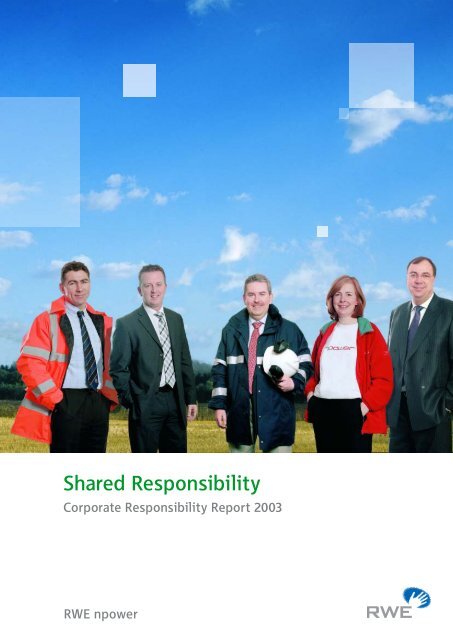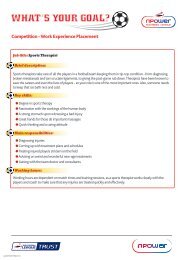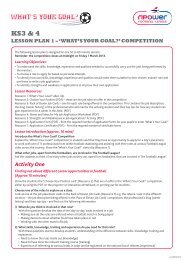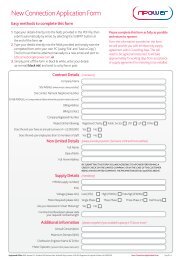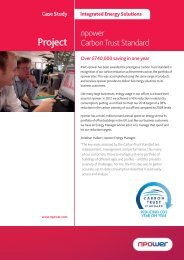Shared Responsibility - Npower
Shared Responsibility - Npower
Shared Responsibility - Npower
Create successful ePaper yourself
Turn your PDF publications into a flip-book with our unique Google optimized e-Paper software.
<strong>Shared</strong> <strong>Responsibility</strong>Corporate <strong>Responsibility</strong> Report 2003RWE npower
We are in the process of rebranding ourcompany to become RWE npower. The Reportis therefore published under the name ofRWE npower. However, the data contained inthe Report is based on 2003 when the companywas RWE Innogy.Andrew Duff, Chief Executive Officer‘I believe that participation in activities that deliver environmentaland social benefits is strategically important, makes good businesssense and is consistent with commercial objectives. We recognisethat our activities have an impact on the communities in whichwe work and are committed to carrying out our business with asense of responsibility.’The aim of this Report is to provide an overview of our approach tocorporate responsibility and to provide our stakeholders with theopportunity to review our business practices. It also aims to provide abalanced assessment of our progress for 2003, whilst setting out futureobjectives. The Report is based on Business in the Community’s corporateresponsibility framework and is set out under four main sections:Marketplace, Environment, Workplace and Community. It describesthose areas where we believe that our operations have the greatestimpact and where our activities can contribute most to the aims ofsustainable development.Contents01 Chief Executive Officer’s Statement02 Company Overview04 Corporate <strong>Responsibility</strong> Policy05 Integrating Corporate <strong>Responsibility</strong>08 Integration Performance Targets09 Working with Stakeholders10 Marketplace16 Environment24 Workplace28 Community33 Verification StatementFront cover (Left to right)Mark PictonStation Chemist, Aberthaw Power StationKevin McCullough Director of npower renewablesJohn RainfordSite Manager, Didcot A and B Power StationsRose GardnerCommunity Relations ManagerJuergen Dennersmann Managing Director, Asset Managementand RenewablesBack cover (Left to right)Anita LongleyZoe EcclestonSaudagar SinghMatt ThomasKevin MilesHead of Corporate <strong>Responsibility</strong>PhysiotherapistDirector of Human ResourcesManager, Renewables and Social BusinessManaging Director, npower Residential
Corporate <strong>Responsibility</strong> Report 2003RWE npower Main Officesand Operating SitesPower StationsCoalAberthaw, Barry, South WalesDidcot A, OxfordshireTilbury, EssexGasDidcot B, OxfordshireLittle Barford, BedfordshireOilFawley, SolentLittlebrook, Dartford, KentCowes, Isle of WightWind FarmsOnshoreBears Down, CornwallBeinn Ghlas, Argyll & Bute, ScotlandBryn Titli, Powys, WalesCarno, Powys, WalesKirkby Moor, CumbriaLambrigg, CumbriaLlyn Alaw, Anglesey, WalesMynydd Gorddu, Ceredigion, WalesNovar, Ross-shire, ScotlandTaff Ely, Rhondda Cynon Taff, WalesTow Law, Co DurhamTrysglwyn, Anglesey, WalesWindy Standard, Dumfries & GallowayOffshoreNorth Hoyle, North WalesHydro SitesAuchtertyre, Perthshire, ScotlandBlantyre, Strathclyde, ScotlandCroesor, Snowdonia, WalesCwm Dyli, Snowdonia, WalesCynwyd, North WalesDolgarrog, Snowdonia, WalesDulyn, Snowdonia, WalesGarry Gulach, ScotlandGlen Tarbert, Fort William, ScotlandCombined Heat and Power StationsAylesford Newsprint, KentBASF, Seal Sands, TeessideBridgewater Paper, WirralRhodia Pharma Solutions, NewcastleDow Corning, Barry, WalesEsso Refinery, FawleyGeorgia Pacific, Bridgend, WalesHuntsman Tioxide, GrimsbyIrish Refiners, WhitegateLancaster University, LancasterLindsey Oil Refinery, KillingholmePhillips Petroleum, Seal Sands, TeessideRhodia Oldbury, OldburyHuntsman Surface Sciences, WhitehavenSCA Hygiene Products, SkelmersdaleOfficesRWE npower HQ, Swindonnpower HQ, Oak House, Worcesternpower call centre, Peterlee, Co Durhamnpower, Stokenpower, Thornabynpower, Birminghamnpower, Leedsnpower, Newcastle upon TyneCogen Court, Solihullnpower renewables, ReadingPower StationsCoalGasOilWindfarmsOnshoreOffshoreHydro SitesCHP PlantOfficesKey figuresExternal revenueInternal revenueTotal revenueEBITDAOperating resultReturn on capital employed (ROCE)WACC before taxValue addedCapital employedCapital expenditureProperty, plant and equipmentFinancial assetsWorkforce€ million€ million€ million€ million€ million%%€ million€ million€ million€ million€ millionFTE 2 20035,552895,6418507149.410.0–427,559215215—12/31/039,3572002 13,562—3,5624573798.110.0–904,687134134—12/31/029,4611Since RWE Innogy was consolidated for the first time as of 1 June, 2002, it is included on a seven-month basis.2Converted to full time equivalent (1 FTE = full-time position).03
Corporate <strong>Responsibility</strong> Report 2003Corporate <strong>Responsibility</strong> PolicyOur Corporate <strong>Responsibility</strong> policy is supported by other company-widepolicies, for example our Equal Opportunities and Diversity and ourOccupational Health and Safety policies.Our Corporate <strong>Responsibility</strong> policy sets out our approach to managing theenvironmental and social impacts of the business. The policy is publishedon our website and is included in induction training for new staff.Throughout our businesses we will operate in an environmentallyand socially responsible manner that reflects the aims of sustainabledevelopment and is consistent with the following principles:To integrate Corporate <strong>Responsibility</strong> into ourbusiness decision-making processes.We recognise the importance for the company ofCorporate <strong>Responsibility</strong> covering environmental,social and ethical issues and we are developingobjectives and targets to support this.To ensure effective communication anddialogue with stakeholders.We recognise that effective communicationis an essential component of our businessperformance. This includes dialogue with all ourstakeholders: including customers, employees,neighbours, Government, and other interestedparties. It means being responsive to concernsand complaints and adopting high standardsof reporting on our environmental and socialperformance.To continuously improve the managementof environmental and social issues in ourbusinesses.We will meet and, where appropriate, exceedthe requirements of all relevant legislation.We are establishing appropriate systemsfor environmental and social responsibilitymanagement at corporate, business and site level,and will set quantifiable targets to continuouslyimprove our performance across environmentaland social issues.To recognise and encourage the contributionof our employees to improved businessperformance and also their contributionto the wider community.We will educate, train and incentivise ouremployees to conduct activities in a mannerconsistent with our principles. In addition,we will encourage and support employees inenvironmental and social action in the widercommunity.04
Corporate <strong>Responsibility</strong> Report 2003Integrating Corporate <strong>Responsibility</strong>Our vision is to create a leading integrated energy business that deliversvalue and profitable solutions to our stakeholders while operating in anenvironmentally and socially responsible manner.StrategyWe recognise that our activities touch manyaspects of people’s lives and we are committedto carrying out our business with a sense ofresponsibility for the environment, our customers,our employees and for the communities in whichwe work. In this way we aim to integrate theprinciples of sustainable development intoour business practice. We support the UKGovernment’s Sustainable Development Strategy,which states that an improved quality of lifeshould incorporate improvements to theenvironment, the economy, natural resourcesand social progress. We recognise that we havea key role to play in delivering this strategy andthat a partnership approach with Governmentand all sectors of society is critical to achievingthat aim.It is important to recognise that there will bechallenges in meeting competing goals. We mustfind a balance between economic, social andenvironmental objectives. We are committed tosupplying increasing amounts of electricity fromrenewable sources and offering our customersgreen energy products, whilst endeavouring todeliver affordable energy to our customers.Where appropriate, we seek to work in partnershipto find innovative and practical solutions tosocial and environmental challenges, such asthe relationship with Greenpeace with respectto npower Juice. Our reputation with ourstakeholders is key to our future. Therefore, foremployees, customers, public bodies and anyonewho may be affected by our operations, we aimto be as accountable as possible.1 npower2 npowerOne3 Generation4 Wind Power5 Hydro6 Cogen1 2 34 5 6Useful website linkswww.sustainable-development.gov.ukwww.rwe.com05
Corporate <strong>Responsibility</strong> Report 2003Corporate <strong>Responsibility</strong> CommitteeIn order to develop an integrated approach tocorporate responsibility across RWE npower,the Board set up a Corporate <strong>Responsibility</strong>Committee in 2001 independently chaired byYvonne Constance, then a non-executive directorof Innogy plc. The Committee is responsible fordeveloping policy, setting targets and objectivesfor corporate responsibility and reviewingperformance against those targets. Its membersinclude our Chief Executive, Andrew Duff, andsenior representatives from all parts of thebusiness. Individual members are responsiblefor delivering specific performance targets andthe aim is to ensure that corporate responsibilityis fully integrated into business decision-makingprocesses.Our Board-level Health and Safety Committeepromotes health and safety best practice,monitors performance against targets andtracks key internal and external issues. It isindependently chaired by Sir Robin Mountfield,and has representatives from across the company.Performance against corporate responsibility andhealth and safety targets is taken into accountwhen judging overall corporate performanceand determining bonus levels.Mike BowdenCompany Secretary andManaging Director of<strong>Shared</strong> ServicesAlison ColeDirector, CorporateCommunicationsDr Hans-Peter MeurerManager, EnvironmentalAffairs, RWE AGAnita LongleyHead of Corporate<strong>Responsibility</strong>Saudagar SinghHuman Resources DirectorJohn McElroyHead of EnvironmentalStrategyPhilip KearDirector, Energy Servicesand Social ActionKevin MilesManaging Director,npower ResidentialYvonne ConstanceChairman, Corporate<strong>Responsibility</strong> CommitteeJohn RainfordSite Manager, Didcot Aand B Power StationsAndrew DuffChief Executive OfficerAlan RobinsonDirector, UK Markets,RWE Trading06
Corporate <strong>Responsibility</strong> Report 2003Corporate GovernanceThe Board of Directors recognises its responsibilityto customers, employees, Government,regulatory authorities, contractors, the public,the environment and stakeholders to manage thecompany in accordance with corporate governancebest practice. As a part of such compliance, theBoard aims to ensure that appropriate controlsare maintained with respect to all existing andfuture aspects of our activities. In particular,risk management processes are in place to meetthe requirements of the Turnbull guidance andthe latest Higgs guidance.BenchmarkingIn 2003 we were ranked 36 in the top 100‘Companies that Count’ by Business in theCommunity (BiTC) and achieved a score of 90%in their Corporate <strong>Responsibility</strong> Index (CRI),compared to last year’s score of 83%. We alsoachieved a score of 94% in the Business in theEnvironment Index, compared to last year’s scoreof 93%. Participation in these indices providesan excellent benchmark and allows us to identifykey strengths and weaknesses that need to beaddressed. It also demonstrates our commitmentto openness and transparency. During 2003 wefocused attention specifically on our communityprogramme as a result of feedback from the 2002CRI survey.Key Impacts and Risk AnalysisIntegrating corporate responsibility into ourbusiness decision-making processes means thatit forms part of the risk management process.We recognise that the value of our company is notbased solely upon its capital assets, but also onits brand and reputation. Our Risk ManagementCommittee (RMC) covers all the business units,includes members of the Corporate <strong>Responsibility</strong>and Health and Safety Committees and is auditedexternally and internally. We have developed arisk management tool, through our involvementwith the SIGMA project, which focuses oncorporate responsibility risks. The SIGMA projectis a joint project between the British StandardsInstitution, the Institute for Social and EthicalAccountability, the DTI and Forum for the Future.We have identified risks and opportunities throughdialogue with key opinion formers and throughan internal workshop. We have reviewed keyreputational risks and those identified have beenfed into the RMC.Useful website linkswww.bitc.org.ukwww.projectsigma.com07
Corporate <strong>Responsibility</strong> Report 2003Integration performance targets for 2004To be a leader in corporate responsibility and be recognised by a rangeof stakeholders as a responsible company by addressing issues that areof concern to them.Targets for 2003Maintain position in BiTC CRI.Undertake key stakeholder audit in December 2003.Pilot a risk assessment model for sustainability impacts inone part of the business.Include corporate responsibility element in all inductionand graduate training.ProgressWe achieved a score of 90% in the BiTC CRI.We undertook an audit of key stakeholders, focusingparticularly on social issues, in November 2003.The results will be followed up in 2004.With Forum for the Future, we held a workshop toidentify key sustainability risks and opportunities forRWE npower. The workshop included managers fromacross the company and results have been incorporatedinto our risk management register.Graduates in our retail business took part in a two-dayvolunteering activity as part of their company induction.RWE npower graduates receive a presentation on CR aspart of their induction. We have included informationon our CR policy and company values in our new staffinduction presentation.Targets for 2004Continue to use the BiTC CRI to inform our CR activities and maintain a score above the index average.Undertake key stakeholder audit December 2004.Develop systems to manage carbon allowances ahead of the implementation of the EU Emissions Trading Scheme.Publish a Statement of Business Principles.Pilot the Chronos training tool on sustainable development with the leadership team and review its use in the company.Useful website linkswww.bcse.org.ukwww.energy-retail.org.ukwww.aepuk.comwww.macmillan.org.ukwww.nea.org.ukwww.aes.org.ukwww.forumforthefuture.org.ukCorporate <strong>Responsibility</strong> WorkshopEmployees have been involved in the identification of corporateresponsibility risks and opportunities, through workshops andconference activities.08
Corporate <strong>Responsibility</strong> Report 2003Working with StakeholdersStakeholders are those who either affect or are affected by theactivities of the company. We endeavour to work in partnership withour stakeholders in order to ensure that our aspirations to become aresponsible company are met.In November we undertook an audit of key opinionformers to identify strengths and weaknesses,risks and opportunities and to review how wecommunicate with our stakeholders. This audithelps us to determine future activities. We alsowork closely with Business in the Community andForum for the Future to develop our corporateresponsibility activities and reporting.We recognise that as a stakeholder ourselves wehave a wider role to play in supporting corporateresponsibility initiatives. Our senior managershave made a positive contribution to sustainabledevelopment through their participation in keyorganisations, such as the UK Business Councilfor Sustainable Energy, the Energy RetailAssociation, the Association of ElectricityProducers, and the Government’s Fuel PovertyAdvisory Group. In addition, our senior managersand employees are involved in a range ofinitiatives, including volunteering, which supportthe local communities in which we work.At our management conference in Novemberwe had presentations from MORI and MacmillanCancer Relief on corporate responsibility andthrough round table discussions reviewedopportunities and risks in key areas for thebusinesses.In 2003 we were pleased to support NationalEnergy Action’s (NEA) Warm Homes Week, whichis an annual winter campaign to raise awareness,primarily amongst politicians, of fuel poverty.The campaign aims to emphasise the benefits ofincreased investment in energy efficiency and toincrease awareness by the fuel poor of grant aidand practical assistance available through theGovernment’s Warm Front grant scheme andother initiatives.We work with a range of stakeholders in deliveringour community objectives. Each power stationhas a Local Liaison Committee, which meetsregularly and provides an opportunity for localresidents to discuss issues and activities relatedto our power station operations. We involved ourstaff in the selection of Macmillan as our charityof the year. In addition we provide matchedfunding for staff who raise money for charity andvolunteering awards to staff for their chosen charity.We have worked with Greenpeace to develop ourgreen electricity product npower Juice. Our HealthThrough Warmth scheme represents a collaborationwith a number of key stakeholders including NEA,the National Health Service, local authorities andother regional groups to alleviate fuel poverty.We have an ongoing dialogue with our regulatorsand Government agencies and are engaged withpolicy makers on key issues. We believe that as anintegrated energy company with a large customerbase, we are able to bring a broad perspective todebates, particularly in areas such as sustainableenergy, carbon trading, addressing customerconcerns, market developments, renewable energy,security of supply and fuel poverty. This yearwe have been working closely with Ofgem andenergywatch to develop the Association of EnergySuppliers’ code of practice for energy suppliers.We regularly monitor our customers’ views throughfocus groups.During 2003 we undertook a comprehensivesurvey of all our employees across the businessesto identify their perceptions of working for thecompany. Whilst the results were generallypositive, there were areas which were identified forimprovement and we have established employeefocus groups to develop action plans to work onthese issues within specific business areas.09
Corporate <strong>Responsibility</strong> Report 2003MarketplaceWe recognise that providing affordable energy and excellent serviceto our customers, whilst meeting and exceeding their expectations,is key to our success as an energy supplier and that customer retentionand acquisition is linked directly to our reputation. We are thereforecommitted to responsible selling practices and customer service. We havea responsibility to provide energy efficiency advice and services for ourvulnerable customers, particularly the fuel poor. We also endeavour tomeet the demands of our customers for renewable energy.Responsible Selling Practices andCustomer ServiceWe undertook some key initiatives in 2003to further reduce customer complaints.We acknowledge that in all the areas outlinedbelow there is still more work to be done,but by October 2003 our overall complaintsto energywatch (the industry’s independentconsumer body) had been reduced by 36%compared to the same period in 2002.In December 2003 npower was regrettably fined£200,000 by Ofgem for inappropriately objectingto some direct debit customers switching to adifferent supplier. As a result, we consolidatedand updated our compliance manual to ensureconsistent practice across the business.In July 2003 Middlesbrough Trading Standardsfined npower £100,000 in relation to our ‘PriceFreeze’ campaign in 2002. The campaign’smarketing material, which invited customersto freeze their prices at their current rates, wasperceived as being misleading in some areaswhere different tariffs were in operation. Weaccepted both decisions and we hope that thechanges to our systems and policies outlinedbelow will help to ensure that such problemsdo not happen again.We have established steering groups for salespractices and for billing and transfer complaintsand have set key performance indicators forselling, which are regularly reported to the seniormanagement team. In 2004 we will focus oncreating more effective customer services andimproving quality and responsiveness.MarketplaceTo meet and exceed customers’ expectations,make efficiencies in business practice andcontinuously improve customer servicestandards.Targets for 2003Contribute to the debate on the transition toa low carbon economy.Commission the 60MW North Hoyle OffshoreWind Farm.ProgressWe have been actively engaged withGovernment.North Hoyle began generatingin November 2003.Improve absolute and relative position onenergywatch complaints table compared to 2002.By October 2003 energywatch complaintshad been reduced by 36% compared to thesame period in 2002. Our relative positionon the energywatch complaints tableremained largely unchanged.Improve customer service standards andreduce complaints – reduce by 25% pressand MPs’complaints.We received a total of 887 complaints fromthe press which represents a reduction of33%. 151 complaints were received fromMPs representing a total reduction of 20%.10
npower JuiceChris Wintle, Business Manager,Specialist MarketsIn August 2001 we launched ournon-premium, green electricity product,npower Juice, in partnership with Greenpeace.For every unit of electricity used by npowerJuice customers, a unit of electricity isgenerated from renewable sources. OnceNorth Hoyle Offshore Wind Farm is fullyoperational it will be the sole supplier ofnpower Juice. By the end of 2003, npowerJuice had over 18,500 customers.Useful website linkswww.npower.com/juice11
Health Through WarmthThe Farleys were referred to Health ThroughWarmth by their health visitor Patricia Marshall.Their home had no fireplace, no heating, risingdamp and was draughty. One year old LiamFarley has chronic lung disease and is at riskfrom frequent chest infections. The family hadto live with their in-laws for fear of Liam’shealth worsening in their cold, damp home.After being referred to Health Through Warmth,we accessed our crisis fund to survey theproperty and to fit a gas fire. An AffordableWarmth grant was accessed, throughWolverhampton City Council, which paid for afull central heating system and the Family TrustFund awarded a grant for the gas fire. Througheffective partnerships, these measures wereinstalled before the end of December 2003 sothat the family could enjoy their first Christmastogether in their warmer, healthier home.Useful website linkswww.nea.org.ukwww.aes.org.ukwww.energywatch.org.ukwww.ofgem.gov.ukwww.warmzones.co.ukwww.solarcentury.co.uk12
MarketplaceSalesWe are committed to eradicating unacceptablesales practices, and have developed internalagent complaint handling procedures. Additionalsafeguards have been added to minimise theimpact of the transfer process on customers.During the course of 2003 complaints classifiedby energywatch as sales complaints droppedby 34%.We also signed the Association of EnergySuppliers’ (AES) voluntary code of practice,which commits us to employing and trainingsuitably skilled people, registering them withEnergysure, following appropriate customercontact practices and having effective complainthandling procedures. The Code also provides forcompensation to customers for proven deliberatefraud. It aims to ensure that energy suppliersadhere to the highest standards in their directsales. npower now has codes of compliance inplace, staff have been trained and a monitoringsystem for complaints has been established.npower was independently audited in Septemberand received an unconditional pass. Our sellingpractices are audited under the AES code ofpractice.Customer Transfersnpower took an active part in encouraging theindustry to form a Customer Transfer Programmeto improve the industry’s performance. We havealso committed to Ofgem’s Erroneous Transferscharter.During 2003 complaints classified by energywatchas transfer complaints reduced by 49%.Billing and Account Administrationnpower engaged fully with energywatch on theirBetter Billing Campaign. energywatch complaintsdata is used to identify and remove the root causesof complaints. During 2003 billing and accountadministration complaints reduced by 16%.Helping Disadvantaged andVulnerable CustomersFuel PovertyFuel poverty exists when a household needs tospend more than 10% of its income on energyto maintain an adequate standard of warmth.In 1998 around four million households inEngland were believed to be living in fuel poverty.The Government has set a target to end fuelpoverty and in particular to ensure that novulnerable household is in fuel poverty by 2010.Health Through WarmthHealth Through Warmth (HTW) was set up bynpower in 2000 in partnership with NationalEnergy Action (NEA), the NHS and other localpartners to help tackle the issue of fuel poverty,associated cold-related illnesses and excess winterdeaths. HTW facilitates the installation of energyefficiency measures and heating where they aremost needed.MarketplaceTo meet and exceed customers’ expectations,make efficiencies in business practice andcontinuously improve customer servicestandards.Targets for 2003Raise awareness and understanding of HealthThrough Warmth (HTW), train more than 2,400key workers and extend the scheme to a furtherfour regions.Continue to raise the environmental awarenessof our customer base i.e. through expansion ofnumber of npower Juice customers.ProgressWe supported NEA’s Warm Homes Week,which aims to raise awareness of fuel povertyacross the UK. HTW has been extendedto a further seven areas and we trained 2,414key workers, made 3,100 referrals, leveraging£1.3m of Government grants. We also spent£243,084 of our Crisis Fund on homes thatwere ineligible for Government grants.We have undertaken a number of initiativesto raise the environmental awareness of ourcustomers. Our npower Juice customer baseincreased from 12,000 at the end of 2002 to18,586 at the end of November 2003.13
Corporate <strong>Responsibility</strong> Report 2003Those living in fuel poverty may be reluctantto seek help, or find it hard to know where tofind help. HTW uses the ‘eyes and ears’ of keyhealth and community workers to identify thosewho seem to be suffering most. Once ‘at-risk’households have been identified they arereferred to a specialist team which assesses therequirements and determines which grants areavailable to help fund improvements. In addition,npower has set up a Crisis Fund providing fundingfor households and measures not eligible forgrants or covered by other schemes.In 2003 the scheme trained over 2,414 keyworkers, received 3,100 referrals, accessed up to£1.3 million in various grants and provided over£243,084 from the npower Crisis Fund. We alsoextended the scheme to a further seven areas inthe UK.We have committed £5.7 million of funding tothe HTW programme over a four year periodand HTW now operates in 17 areas of the UK.The main strength of HTW is its use of existinglocal networks and the way it has fosteredgenuine partnerships. We are currently workingwith the University of Birmingham to carry outresearch to assess the change in health statusamong recipients of HTW measures, the widerimpact on the community and to makerecommendations for the future focus of HTW.Warm Zonesnpower is the main sponsor of three of theGovernment’s five Warm Zones: Sandwell,Northumberland and Hull. Warm Zones worksby targeting all households in an area and thenproviding improvement measures through grants.The scheme incorporates a benefits health check,financial advice and support programmes.The three npower Zones have over 350,000households and by the end of December 2003some 175,000 homes had been visited andassessed by Warm Zones. Over 16,000 fuel poorhouseholds have been identified and the totalinvestment in measures for homes is nowestimated to exceed £12 million.Energy EfficiencyWe have obligations under our supply licencesto achieve energy efficiency improvements inour customer properties and to promote energyefficiency. This is known as the Energy EfficiencyCommitment (EEC). EEC also requires us toachieve 50% of the energy savings in householdsin the Priority Group (those in receipt of definedbenefits and tax credits). At the end of 2003,34,727 of our customers were on the PriorityServices Register. npower’s Savings for Lifepackage offers households a potential savingof £200 a year by more efficient energy use.The scheme offers discounted prices on cavitywall and loft insulation, a home energy surveyfor targeting trouble spots and tips on usingenergy more efficiently.Energy Efficiency Targets and PerformanceEEC dataEESOP (2000–2002)npower (excludesYorkshire and Northern)EEC (2002–2005)Target606GWh8,299.507GWhActual700GWh160 ktonnes CO 24,379.739GWh*Total Number of energywatchComplaints – npower20,00015,00010,00014,1539,023Graph Data SourceMonthly energywatchcomplaints statistics providedby energywatch monthly(April 02 to date) and referto all sales, transfer, accountadministration and billingcomplaints.energywatch data collectionstarted in April 2002, figuresfor November/December 2003were not available at time ofgoing to print.*Achieved to date. Reported to Ofgem up to 31 December 20035,0000April 02–Oct 02April 03–Oct 0314
MarketplaceMeeting the Demand for Renewable Energyfrom our Customersnpower JuiceIn November 2003 we launched the npower JuiceFund. This is designed to bridge the funding gapfor those renewable technologies, such as waveand tidal power, in the early pre-commercialphase of development. npower will make anannual contribution to the Fund of £10 for everycustomer that stays with npower Juice – up to amaximum of £500,000 per year.SolarWe are working in partnership with Solar Centuryto pilot the installation of photovoltaics atdomestic premises. The pilot scheme involves100 homes around the country and tests thefeasibility of creating a mass market for solarpower. The households will be able to sell anyexcess electricity they generate to npower.The trial will provide data on solar electricitygeneration and energy use in the home andwill allow measurement of the amount of energygenerated. This will enable us to estimate thevalue of the energy generated and offset itagainst our renewable obligations.Working with SuppliersWe recognise the importance of supply chain issueswithin the context of corporate responsibility.Our procurement process requires major suppliersand contractors to inform us of their environmentaland health and safety policy and practice. Suppliersare also expected to complete a risk assessmentform when tendering for major contracts.We subscribe to the Utilities Vendor Databasewhich requires suppliers to demonstrate theircompliance with environmental and health andsafety legislation. In recognition of the increasedimportance of corporate responsibility in thesupply chain, we are actively involved in a utilityindustry forum, specifically to deal with supplychain issues, which aims to raise CR awareness.This makes the arrangement cost-effective forboth supplier and householder and could bea boost to the mass take-up of solar power.The scheme is also making investigations intohow distributed micro-generation might behandled in npower’s billing systems.Energy EfficiencyWe provide a range of energy efficiency products and services,such as energy efficient heating, lighting, appliances and insulation.For example, we work with a home insulation company to provideproducts such as cavity wall and loft insulation. This year we provided10,227 of our customers with energy efficiency advice.Targets for 2004Contribute £10 to npower Juice Fund for every npower Juice customer to sponsor research and developmentinto new renewable energy technologies. Invite and fund applications to around £190,000 in 2004.Achieve 10% awareness of green energy and npower Juice (measured in focus groups) and achieve npower Juicesales to 26,000 customers.Raise awareness and understanding of Health Through Warmth (HTW) and increase referrals to 4,000.Initiate £1.5m worth of grant-aided measures in homes through HTW.Improve customer service standards and reduce customer complaints – reduce by 10% press and MP complaints.Monitor customer perspectives of our performance through an independent customer survey (80% of customersagreeing that the service they have received is satisfactory).Reduce energywatch billing complaints (gas and electricity) by 25% based on 2003 benchmark.15
Corporate <strong>Responsibility</strong> Report 2003EnvironmentOur approach to environmental management is to ensure thatenvironmental issues are fully integrated into our business and thatappropriate processes are in place to manage key environmental impacts.We are continually working to minimise the impact of our operations onthe environment and to improve the management of environmental issueswithin the company.Stephen Timms MP, Energy Minister‘North Hoyle is a flagship development that is now officially a part ofthe UK’s energy mix. What is currently seen as innovative on the partof its builders should become commonplace as we increasingly turnto renewable sources to meet more of our energy demands.’Environmental ManagementAll our major generating sites and our largercombined heat and power (CHP) stations haveseparate environmental management systems(EMS) certified to ISO 14001. Other parts ofthe business also have a certified EMS whereappropriate. During 2003 npower extended theirEMS to cover the whole of the retail business andthis is now certified to ISO 14001. An EMS coversmanagement of our other office buildings butthis is not currently certified to ISO 14001. We areplanning to extend the npower EMS to includeour other office buildings in the coming year.Having an EMS in place ensures that we minimiseour environmental risks and that we operatewithin the requirements of appropriate legislation.However there are occasional events when we doexceed the limits placed on us by the EnvironmentAgency. We have developed procedures to respondquickly and effectively to any such incident.EnvironmentTo continuously improve environmentalmanagement and to ensure that our activitiesdo not cause harm to the environment.Targets for 2003Commission the 60MW North HoyleOffshore Wind Farm.Achieve a place in the top level of the Businessin the Environment (BiE) benchmark.Extend npower’s certified EMS across themain areas of the business and achieve fullcertification.No exceedences of authorisation limits thatresult in improvement conditions from theEnvironment Agency.ProgressNorth Hoyle Offshore Wind Farm startedgenerating electricity in November 2003.We achieved a score of 94% in the BiE index,compared to 93.4% in 2002.npower’s EMS achieved accreditation toISO 14001 in November 2003.There was one exceedence of an authorisationcondition, which did not result in anyimprovement conditions being applied.16
Kevin Brown, Service Engineer,North Hoyle Offshore Wind FarmIn November 2003 our North Hoyle OffshoreWind Farm, the first major wind farm to be builtin UK waters began generating. North Hoyleis located 7–8km off the North Wales coastbetween Prestatyn and Rhyl and consists of30 wind turbines with a maximum capacityof 60MW. It will offset the release of around160,000 tonnes of CO 2 into the atmosphereper year and be the sole supplier of electricityfor up to 50,000 customers of npower Juice.Throughout the construction process weconsulted widely with the local community.Newsletters were mailed to local homes andinformation boards were also placed on theseafront at Rhyl and Prestatyn.Renewable Electricity Generated (GWh)2002*Total: 621GWhWind (536)Hydro (85)*Including generation from ourUS sites which have now beensold. UK wind generation in2002 was 386GWh.2003Total: 469GWhWind (390)Hydro (66)Biomass (13)17
Corporate <strong>Responsibility</strong> Report 2003During 2003 an incident at one of our CHP plantresulted in an exceedence of the limits in itsauthorisation conditions. In addition there werea number of incidents resulting in discharges tothe environment, which did not, however, exceedauthorisation conditions. All these occurrencesresulted in little or no environmental impact.We have been working with the EnvironmentAgency to put measures in place to preventfurther such occurrences.Climate ChangeThere is growing scientific evidence that emissionsof greenhouse gases caused by human activityare having a noticeable effect on the earth’sclimate. Climate change is a global issue,requiring a global response through measuressuch as the Kyoto Protocol. A key aim in the UKGovernment’s Energy White Paper, which waspublished in February 2003, is to cut the UK’scarbon dioxide (CO 2 ) emissions by 60% by 2050with real progress towards this target by 2020.We are committed to playing our part in reducingemissions of greenhouse gases and helping theUK Government to meet its climate change targets.However, the emissions of CO 2 from our portfolioare primarily determined by the competitivemarket in which we operate. During 2003our emissions of CO 2 were 27.5 million tonnes(Mtonnes) compared with 23.5 Mtonnes in 2002,and emissions per unit of electricity generatedincreased compared with emissions in 2002.This increase was mainly as a result of increasedgeneration at our coal-fired power stations.Generation at our coal-fired power stationsincreased because of the continued high pricesof gas and also because of lower availability ofother power stations in the UK.Atmospheric Emissions from Power StationsEmissions of pollutants such as sulphur dioxide(SO 2 ), nitrogen oxides (NO x ) and particulatesare an inevitable consequence of burning fossilfuels in power stations. Authorisations from theEnvironment Agency for our power stations setlimits on the amounts of these pollutants thatwe can release into the environment. Reducingemissions of these pollutants is a key driver forus in ensuring that we can maintain levels ofgeneration across our portfolio.Over the last year emissions per unit of electricitygenerated of SO 2 decreased compared withemissions in 2002 due to an increased use of lowsulphur coal. Emissions of NO x and dust increasedslightly due to increased generation at ourcoal-fired power stations. We remained well withinthe overall limits set by the Environment Agencyalthough our total emissions of SO 2 and NO xincreased compared with 2002.CO 2 Emissions(Mtonnes)CO 2 Emissions(g/kWh)Detailed data can be found on our websiteat www.rwenpower.com/cr/environment40302023.527.580060040067970820022003Useful website linkswww.dti.gov.uk/energy/whitepaper/index.shtmlwww.environment-agency.gov.ukwww.npower-renewables.com102000 018
EnvironmentAir Quality Management Plans are in place at allour coal and oil-fired power stations. These plansprovide a mechanism to ensure that operation ofour power stations does not lead to exceedencesof the EU and UK National Air Quality Strategytargets, which come into effect in 2004 and 2005respectively. We have completed our schedule ofinstallation for air quality monitoring sites andreport quarterly to the Environment Agency on theimpacts of our power stations on local air quality.During 2003 measured levels of pollutants werewell within the levels required by future National AirQuality Strategy targets.In response to forthcoming European legislationaimed at reducing emissions of SO 2 , NO x anddust, we submitted a planning application to theDTI in August 2003 for consent to build a FlueGas Desulphurisation (FGD) plant at Aberthawpower station. The application seeks permissionto build a plant that would use seawater toconvert the SO 2 in the flue gases to sodiumsulphate and calcium sulphate, both of whichoccur naturally in the sea. If consent is giventhe plant could be operational by 2008.An executive summary of the environmentalimpact assessment of the project is availableon www.rwenpower.com/pdf/Aberthaw.pdf.Emissions TradingWe believe that the EU Emissions Trading Scheme,which is due to begin in January 2005, will be aneffective mechanism for reducing CO 2 emissions,provided it is introduced in a way that allows anefficient market to develop.During 2003 we have actively contributed tothe consultations on how the Emissions TradingScheme should be introduced and have takensteps to ensure that our operational proceduresare developed. In 2004 we will continue thiswork to ensure that our systems are ready totake account of the impacts of the scheme onthe electricity market.Little Barford Power StationImproving the efficiency of our power stations has always beenimportant, and will become increasingly important after the EUEmissions Trading Scheme begins.SO 2 , NO x and Dust Emissions(ktonnes)SO 2 , NO x and Dust Emissions(g/kWh)1007591.896.463.573.64.03.02.652.4820022003502.01.831.90251.00 0.02.613.410.080.09SO 2NO xDustSO 2NO xDust19
Mark Picton, Station Chemist,Aberthaw LagoonThe saline lagoon at Aberthaw power stationis one of only four such habitats in Wales andis the focus for our Biodiversity Action Plan forthe site. In 2003 we completed the first fullyear of the site management plan. Surveys ofthe site were carried out and work to improvethe habitat around the lagoon was undertaken.We work in partnership with the Wildlife Trustof South and West Wales. Staff volunteering atthe power stations sites is an important aspectof the Biodiversity Action Plans.Sales of Ash(ktonnes)400300200100374404Recycled Waste(tonnes)40003000200010002,9372,581200220030 020
EnvironmentRenewablesIncreasing renewables capacity plays animportant part in the reduction of greenhousegases. The Renewables Obligation (RO) onelectricity suppliers was introduced in April 2002.The Obligation sets a target for electricity suppliersto source a percentage of their electricity fromrenewable generators or to pay a buy-out priceif this is not achieved. Between April 2002 andMarch 2003 our RO and Scottish RO were a totalof 1.9TWh of which we redeemed around 23% asRenewables Obligation Certificates (ROCs) andmade buy-out payments against the remainder.The money from buy-out payments is recycledback to help the renewables industry to fund moreprojects. Across Great Britain as a whole 59% ofthe total RO was met by the supply of certificates.In 2003 we generated a total of 469GWh fromrenewable resources compared to 621GWhduring 2002. Low rainfall and lower than averagewindspeeds during the year were the main causesfor the reduction in generation during 2003.Wind PowerThe introduction of the RO has provided astimulus to the development of renewableenergy generation. During 2003 we worked onthe construction of Causeymire, a 48MW windfarm in Scotland which will be one of the mostpowerful onshore wind energy projects in theUK. We also gained planning consent for a new20.8MW project in South Wales.Stephen Tindale, Executive Director of GreenpeaceUK, welcomed North Hoyle’s completion stating,‘The launch of the North Hoyle wind farm isthe beginning of mainstream wind powerdevelopment and the dawn of a new clean energyera for Britain. Global warming is the greatestthreat facing the planet, but the power flowingashore today demonstrates we have the solutionsto tackle it. It’s great news for all our futures’.In December 2003 the Government announcedsites for the next round of offshore winddevelopment. We were successful in our bids fortwo sites: one off the North Wales coast close toNorth Hoyle and the other in the Wash. The site inthe Wash, known as Tritton Knoll Offshore WindFarm, is the largest proposed offshore wind farmsite in the world, with a potential capacity of900–1200MW.HydroIn 2003 several hydro sites across the UK were inthe planning process while construction began attwo new sites in Scotland – Braevallich (2.19MW)and Garrogie (2.3MW).EnvironmentTo continuously improve environmentalmanagement and to ensure that our activitiesdo not cause harm to the environment.Targets for 2003Optimise SO 2 emissions per unit of output.Improve energy efficiency, resource useand recycling in office accommodation.ProgressEmissions of SO 2 remained belowauthorisation limits. Generation from ourportfolio increased and emissions per unitof electricity generated decreased.We started to implement a new buildingmanagement system in our Swindon offices.npower introduced a number of resourcesaving measures as part of their EMS.21
Corporate <strong>Responsibility</strong> Report 2003Use of ResourcesImproving the efficiency in the use of naturalresources is a key part of moving towards a moresustainable future. Improving the efficiency ofour power stations has always been importantand will become increasingly important after theEU Emissions Trading Scheme begins.Dolgarrog Hydro Power Station in North Waleshas a capacity of 39MW.Stanley Mills began operating in its reliabilityphase (840kW) in autumn 2003. During thedevelopment and construction of the StanleyMills Scheme, our hydroelectric developmentteam worked closely with the Tay SalmonFisheries Board to ensure that appropriatemeasures were incorporated into the schemeto protect local salmon.BiomassWe have undertaken trials of wood co-firing atour coal-fired power stations – Didcot, Tilbury andAberthaw. At Aberthaw we have started trials todirectly burn biomass in the boiler. This schemewill use wood from local forestry sources andis supporting the Welsh Forestry Industry.If successful, this would lead to construction ofan on-site wood processing facility that wouldenable the station to use purpose grown energycrops in the future.Over the last year we reviewed the potential forefficiency improvements at our power stations.The review identified the marginal costs ofcarbon abatement and the total amounts ofcarbon reduction available, which we will takeinto consideration when considering whatimprovements we can make.Use of resources is one of the key environmentalaspects of our office-based activities. All our majoroffice buildings are now covered by an EMS andhave targets for improvements in energy and wateruse. npower introduced a number of resourcesavingmeasures as part of their EMS, including:• Encouraging staff members to turn offmonitors and light switches when not in use.• Installing a company-wide car share databaseand a company transport charter.• Monitoring paper use within offices, usingonly sustainably-sourced paper and settingphotocopiers to default to double-sidedprinting.• Improving waste management at all sitesand introducing paper recycling across thebusiness.Use of Resources in BuildingsRWE npower HeadquartersUse of Resources in Buildingsnpower Buildings100007500500025003,5473,3318,4497,8057,6636,28360,00045,00030,00015,00036,35024,74844,19545,896200220030 0479323GasMWhElectricMWhWaterm 3GasMWhElectricMWhWaterm 322
EnvironmentBiodiversityBiodiversity is the natural variety of life on earth,encompassing all species of plants and animals.It is being lost at an increasing rate throughoutthe world as a result of human activity. Theneed to halt this loss has been recognised atinternational level through the InternationalConvention on Biodiversity. The UK hasimplemented the EU Habitats Directive and hasdeveloped a national Biodiversity Action Plan.In October 2002 the UK Government launchedEngland’s Biodiversity Strategy ‘Working withthe Grain of Nature’. This Strategy encouragesbusinesses to act for biodiversity, for examplethrough adoption of company BiodiversityAction Plans.We carried out a number of activities over thelast year to support our biodiversity framework:• We developed the Biodiversity Action Plansfor Fawley and Aberthaw power stations.At Fawley we carried out a number of surveysin partnership with the Hampshire WildlifeTrust (HWT) and HWT were commissionedto provide site management advice andsupervision to manage the site in keepingwith its surroundings.• We hosted a seminar for businesses in theSwindon area to support the developmentof a Swindon Biodiversity Action Plan.RWE npower has an established biodiversityframework which focuses on:• Conserving and enhancing biodiversitywithin our boundaries.• Minimising the effect of our operationsbeyond our boundaries where we may havea direct effect.• Promoting biodiversity beyond any effectsof RWE npower’s operations by supportingthe UK’s biodiversity initiatives.Environmental Education Centre, Sutton CourtenayWe continue to support the Sutton Courtenay Environment Centrenear Didcot power station, through the landfill tax credit scheme.Last year we provided a contribution to the Berkshire, Buckinghamshire& Oxfordshire Wildlife Trust towards a teaching post at the Centre.Targets for 2004Achieve 84MW consent for wind and 8MW for hydro renewables generation.Maintain an above average score in the BiE environment benchmark.Review EMS across the business based on the results of an RWE audit. Develop an action plan to ensure a consistentapproach across RWE npower including the corporate centre.Aim for no environmental breaches that result in improvement conditions from the Environment Agency.Fully comply with SO 2 authorisation conditions and demonstrate compliance with National Air Quality Strategy targets.Improve energy efficiency, resource use and recycling in office accommodation:• Reduce our baseline energy use by 4%• Reduce paper use by 10%• Reduce baseline water use by 2%• Increase recycling of materials by 5%We will introduce travel plans to three more sites.23
Corporate <strong>Responsibility</strong> Report 2003WorkplaceWe are committed to supporting staff development, effective successionplanning and career management. We are committed to ensuring asafe working environment, the prevention of work-related ill-healthand the promotion of staff well-being. Promoting equal opportunitiesand diversity in the workforce is essential for attracting, retaining anddeveloping a diverse workforce and providing equal opportunities.Company ValuesThe success of our business depends upon ourstaff. In order to work effectively, we recognisethat our staff need to know what we stand foras an organisation. Our company values areas follows: ‘In the service of our customers,stakeholders and employees we value: innovation,trust, leadership, commercial excellence andworking together’. Our values form part of theperformance management processes across thecompany, including the Leadership DevelopmentProgramme for senior managers. npower hasinterpreted the spirit of our corporate values intoCustomer FIRST values. These focus on the needsof our customers and npower staff have receivedtraining on the values and what they mean inpractice.We carried out a comprehensive employee surveyin 2003. We had a return rate of 53% of whom60% stated that the company was ‘a greatplace to work’. Whilst the results were generallypositive, there were areas which were identifiedfor improvement. In particular, perceptions of jobsecurity and salaries were less positive in someareas of the business. We have set up employeefocus groups to develop action plans to workon these issues within specific business areas.We will monitor these plans during 2004 andanother survey is planned for 2005.Leadership DevelopmentWe run a Leadership Development Programmeand an Advanced Management Programme forour senior managers. This year we completed asenior management audit which identified thestrengths and weaknesses of this group andhighlighted priorities for their developmentover the coming year.WorkplaceTo recognise and encourage the contributionof all our employees to improve businessperformance and to provide support forindividuals to fulfil their potential.Targets for 2003Deliver objectives from business diversityaction plans based on benchmark fordiversity across all the businesses.Undertake a company-wide staff satisfactionsurvey, provide feedback and demonstratethat follow-up actions have been taken.Review the use of company values in staffassessment and how values are communicatedand demonstrated.ProgressWe have undertaken an analysis of gender,age and ethnic origin amongst our workforce.Equal Opportunities Officers have beenappointed and trained for each business,and respective HR policies and practiceshave been audited.53% of staff responded to the staff survey –60% of whom agreed that the company is‘a great place to work’. Senior managers andstaff have received briefing on the surveyresults. We will review less satisfactory areas.Company values form an integral partof our performance review process.24
Lynda Guthkelch, Occupational Health NurseFor over ten years, our Occupational Healthteam has offered voluntary health screening toour staff. Various health promotion initiativestake place at our sites and we provide a fitnessand physiotherapy centre at our headquartersin Swindon as well as gyms at many of ourmajor locations. We aim to prevent work-relatedill-health and perform health surveillancewhere appropriate. Staff are also providedwith information about stress and haveaccess to our Occupational Health Nursesfor confidential advice and to an externaltelephone counselling service.Accident Frequency Rate (AFR)StaffContractorCombinedRecordable InjuriesFrequency Rate (RIFR)StaffContractorCombinedNumber of DangerousOccurrencesTarget0.12*0.40—2.655.70—Less than 5Actual0.280.570.312.653.552.773*The staff AFR target for 2003was 0.12 rather than 0.28as described in the hardcopy report.25
Corporate <strong>Responsibility</strong> Report 2003Equal Opportunities and DiversityWe updated our Equal Opportunities andDiversity (EOD) policy in 2003. We are committedto achieving equal opportunity and diversity inour business practices. Fairness in the way wetreat our staff is essential, not only for us toattract and retain employees but also toenable us to develop and sustain good workingrelationships whilst increasing productivityand efficiency. We are convinced that a diverseworkforce is better placed to meet the needs ofour diverse customer base. We have reported onage, gender and ethnicity this year, but have beenunable to include data on disability. The data ondisability are less reliable because their capturerelies on self-classification and disclosure.Whilst we have made progress in developingand implementing family friendly policies andworking practices, the introduction of new equalopportunity legislation, particularly relating todiscrimination on the grounds of religion, beliefor sexual orientation will provide us with newchallenges and opportunities during 2004. In thelight of this, we will be seeking ways to improveour EOD strategy, placing emphasis on awarenesstraining and education of staff at all levels.Occupational HealthThe Promotion of WellbeingOur voluntary health screening enables employeesto undergo a comprehensive and confidential‘check-up’. The aim is to detect diseases at an earlystage and to offer appropriate lifestyle advice inorder to reduce the risk of preventable conditions.The anonymous data collected provides a pictureof the current health status of the workforce andalso demonstrates trends over time. We havea Group Stress Policy and we have launched amanagement training programme which includesguidance in the use of a web-based riskassessment tool.Health ProtectionWe are committed to helping achieve theGovernment’s targets, set out in their OccupationalHealth Strategy ‘Securing Health Together’, fora reduction in work-related ill-health and havedeveloped systems that put us in a strong positionto quantify progress. We believe the comprehensivenature of our measuring systems ensures thatwe identify most cases of work-related ill-health.Our overall sickness absence rate remained lowerthan the CBI average this year, falling from 2.6%to 2.3% (CBI average 2.9%).Health surveillance of employees exposed tocertain specific health risks has continued.We have continued to demonstrate goodcontrol of hazardous noise-induced deafness,for example.RWE npower Staff Male/Female Ratio(Data as at December 2003)RWE npower Staff by Ethnicity(Data as at December 2003)RWE npower Staff by Age(Data as at December 2003)Male (59.96%)Female (40.04%)White British Employees (81%)Employees from Ethnic Minorities(includes Asian, Black, Chinese,Mixed Race and White Irish) (5%)Not Disclosed (14%)16–25 (24%)26–35 (30%)36–45 (24.5%)46–55 (17%)56–65 (4%)65+ (0.5%)26
WorkplaceSafetyWe are committed to protecting our staff, businesspartners, customers and the public from injuryas well as safeguarding our assets from loss,damage and business disruption.Regrettably during 2003 we saw an unacceptablerise in the number of lost time accidents acrossour operational businesses which led to anincrease in our staff and contractors AccidentFrequency Rate (AFR). Improvement plans arebeing developed at operational site level. As aresult of this increase, a deduction was madeas part of the annual performance and bonusassessment. External benchmarking hasdemonstrated good overall performance and weachieved upper quartile performance. We hadno prosecutions for health and safety this year.Our Pension SchemeWe sponsor the largest Group within theindustry-wide Electricity Supply Pension Scheme(ESPS) and have around 38,000 members (morethan 25,000 of whom are pensioners). We monitorchanges in the membership profile, and listen tothe views of members. We aim to respond to theseviews rather than waiting for legislation to forcechanges. For example, this year we introducedDiscretionary Dependants’ Pensions, where, on thedeath of a member, the Trustees have the discretionto award a pension to an unmarried partner ofeither sex, where there is no legal spouse.In 2003 we relaunched our Benevolent Society whichis a charity created for staff and retired employeesin need of practical, emotional or financial help.We undertook a number of safety improvementinitiatives throughout the company in 2003including:• A ‘Slip and Trip’ programme has been runningin npowerOne throughout 2003. There hasbeen a 4% decrease in the number of slips,trips and falls compared to 2002.• An employee-led behavioural safety teamconcentrates on promoting changes topractices and behaviour, by encouragingmaking the safest option the first choice.• npower are rolling out a revitalising Healthand Safety Awareness review course for allmanagers and team leaders.Peter McLellan, Head of Health and Safety‘We recognise the value of a secure, safe and healthy workingenvironment and have a strong, embedded safety culture.Our company-wide Health, Safety and Security Policy commits usto being progressive and to strive for continuous improvement.’Targets for 2004Deliver objectives from business diversity action plans and demonstrate improvements in diversity across thecompany, based on 2003 benchmarks.Put into action a High Potential Programme to ensure that we have a talented pool of senior managers.Implement initiatives arising from the staff survey, demonstrate improvements and monitor staff satisfaction in key areas.Review use of company values in staff assessment and how values are communicated and demonstrated.27
Corporate <strong>Responsibility</strong> Report 2003CommunityWe aim to develop partnerships which create trust within thecommunities in which we operate. We recognise that our operations,particularly our power stations, have the potential to impact negativelyon local residents and we aim to keep this to a minimum.We are committed to supporting local initiativesas well as national programmes, by workingin partnership with community groups andcharities. Our community stakeholders includeour employees, communities surrounding ourpower stations and wind farm developments,our customers, schools, and the fuel poor.A group of local school children being taken roundTilbury Power StationOur community strategy is based on thefollowing principles:• We believe that involvement in the localcommunity helps to improve perceptions ofthe company and that participation in localvolunteering helps to maintain staff morale,which in turn benefits employee retentionand recruitment.• Support for local initiatives helps to buildrelationships and trust and maintains our‘licence to operate’, particularly aroundpower stations.• npower is a relatively young brand and ourcustomer base has grown significantly over thelast two years. Community programmes in ourthree core customer regions help to build trustin the company, providing a human face to a‘faceless commodity’.• Free educational resources and environmentalcentres at power stations raise awarenessand understanding of the environment forfuture generations.CommunityTo maintain and develop a company-widecommunity investment programme whichprovides benefits to both the business andthe communities in which we operate anddevelops effective relationships with thelocal communities.Targets for 2003Deliver one company-widecommunity initiative.Increase the number of staff participating incommunity volunteering and monitor feedbackof benefits.Aim for no justified complaints at ouroperational sites.ProgressOn 23 May we held a ChildLine fundraisingday, involving activities across all the sites.488 members of staff were involved involunteering throughout 2003 – compared to200 in 2002. The feedback gathered will beused to develop our volunteering programme.There were five justified complaints at ourpower station operational sites.28
Federation of Disability SportIn partnership with the English Federationof Disability Sport (EFDS) and the Federationof Disability Sports Organisations (FDSO) werun our npower active programme in our threecore areas. The partnership demonstratesour commitment to social inclusion.The programme enables greater opportunitiesfor people with disabilities to take part in awide range of sports. Teams of employees fromacross the company have assisted at a numberof events this year.‘Over the last couple of years the EFDS hasbuilt up a fantastic working relationship withnpower which has enabled a lot of disabledpeople in England to enjoy a wide range ofsport and physical activities. It is not just themoney, essential though it is, that makes thepartnership between the EFDS and npower soimportant, it is the massive commitment interms of time and effort that has been shownby staff at the company.’Colin Chaytors, Chief Executive,Federation of Disability SportUseful website linkswww.efds.netwww.npower.com/education/homepage.aspx29
Liz Gater, Education Development OfficerAn education programme was designed forschools local to the North Hoyle OffshoreWind Farm. The programme, which is beingimplemented by the education charity CREATE,covers energy efficiency, sustainability andrenewable energy, plus information aboutNorth Hoyle.In 2003 we became one of 122 companiesawarded Business in the Community’s PerCentstandard. The PerCent standard is a voluntarybenchmark and seeks to promote corporatebehaviour that improves the impact thatbusiness has on society. The logo is awardedto those companies that donate at least 1% oftheir pre-tax profits to the community – thisincludes a combination of cash, employeetime, gifts in kind and management costs.30
CommunityEach power station has a Local LiaisonCommittee, which meets regularly and providesan opportunity for local residents to discussissues and activities related to our power stationoperations. We also produce newsletters forlocal communities to keep them informed of ouractivities. We had five justified complaints frompower station operations, compared with tenlast year.Our community activity focuses on three keyareas: Education, Environment and Disability.EducationThe core of our education work is ‘Energy to live,energy to learn’, which is a national educationprogramme covering our three core customerregions and the localities around our powerstations and wind farms. The programme hasthree main components: educational resources,presentations in schools and interactivepower days.In partnership with schools, npower has producedthree free educational ‘Power Pack®’ resourcesfor schools and community groups. The packscover Key Stage 1 and 2 for pupils and the‘Power Pack® – An easy guide to energy’ has beenproduced for young adults. These resources arelinked to the National Curriculum and we havereceived good feedback from teachers.To complement our Power Packs, we have a freein-school presentation service, which covers thesafe use of electricity, general information onenergy and renewable energy. A growing numberof our staff are involved in this programme, aspart of their personal development plans. We runthis in our core customer areas.In addition, our ‘Power Days’ are interactiveworkshops covering a range of ‘power’ themedtopics which are fun, activity-based sessions forupper Key Stage 2 pupils. We run these in ourcore customer areas.We are also helping to raise the profile ofengineering in schools by funding the GCSEEngineering Steering Group.e-mentoringOur staff are involved in the Government-supportede-mentoring programme which assists childrenin education action zones around the country.It enables mentors and mentees to communicatesafely via a secure website on a range of issues insupport of the National Curriculum. Over £8,525has been generated through matched-funding tosupport participating schools.Tag RugbyWorking with former England and British Lionsrugby player Ben Clarke, we supported a seriesof Tag Rugby Festivals across the country.84 schools close to our sites participated in thescheme, giving 1,725 pupils the opportunity tolearn how to play Tag Rugby.Community contributions for 2003 followingthe London Benchmarking Group (LBG)model which provides a standard forcommunity reporting.Community Investment 2003**In 2002, our total CommunityInvestment was £1,542,894,which included £293,570Landfill Tax Credit funds.Charitable (£492,484)Community Investment (£600,787)Commercial Activity (£128,437)Total: £1,221,708 (including £141,884of Landfill Tax Credit funds)31
Corporate <strong>Responsibility</strong> Report 2003Participating schools also received Tag Rugbyequipment. We were keen to support a team-basedsport which promoted inclusiveness and wasaccessible to a wide range of players, girls andboys, of all abilities.EnvironmentWe support the Wildlife Trust in our threecore customer areas, and in the Swindon area.We work in partnership with the Trust to supportinnovative environmental initiatives which givedirect benefit to the local community. Thepartnership offers employees the opportunityto become involved in Wildlife Trust projects,enabling them to learn new skills whilstcontributing to the community. For example,fifty employees from our Leeds office helped toconstruct a boardwalk for disabled access toAskham Bog, near York. These volunteeringprojects also enable the WildlifeTrust to accessadditional funding which can be reinvested intoother conservation projects.Charitable DonationsOur Charities Committee has representativesfrom across the company and is chaired by MikeBowden, our Company Secretary. Our supportis focused on charities and community groupswhich are close to our operational sites. During2003 over £280,000 was donated to sixtyorganisations.We have chosen Macmillan Cancer Relief as ournew corporate charity for 2004–05. Our employeeswere involved in the selection process, and wehope that this will encourage further support forfundraising and volunteering activities.Through our Landfill Tax Credit funds, weprovided £114,000, via Community First, towardsthe Lydiard Park Renaissance Project in Swindon,close to our company headquarters. The projectaims to preserve and enhance an historiclandscape whilst improving access, leisure andeducational opportunities on the site. We areproud that our partnership in this project helpedSwindon Borough Council achieve a HeritageLottery Grant for the project.ChildLine DayOn 23 May we held a company-wide ChildLine day to raise funds forChildLine. The theme for the day was ‘Whiter than White’, linking itto our cricket sponsorship. Activities took place at all our sites andincluded cream teas, spongeball cricket matches and fancy dress.We raised over £36,000 for ChildLine. During 2003, we raised a totalof £212,484 for ChildLine.Targets for 2004Review and publish our community strategy.Reach at least 9,000 pupils through our ‘Energy to live, energy to learn’ education programme.Increase to 800 the number of staff participating in community volunteering and monitor feedback.Aim for no justified complaints at our operational sites.32
Verification StatementVerification ObjectivesEnviros Consulting Limited has been commissionedby RWE npower to conduct an independentverification of the Corporate <strong>Responsibility</strong>Report 2003 and supporting web-based data.The objectives were to verify the completenessand accuracy of statements made and to reviewsystems for data collection.ResponsibilitiesThe information and presentation of data withinthe Corporate <strong>Responsibility</strong> Report 2003 and thesupporting web-based data is the responsibility ofRWE npower. This statement is the responsibilityof Enviros and represents our independent opinion.Verification MethodThe verification was conducted by meetings,telephone discussions and email correspondencewith staff responsible for collating the data onwhich the Report and web-based data were based,and for managing specific operational issues.Both quantitative and qualitative data weresubstantiated through these meetings andsupporting core data were sampled for accuracy,completeness and interpretation.OpinionAccuracy and Completeness of the Reportand Web-based DataFor the areas included in the Corporate<strong>Responsibility</strong> Report 2003 and web-based data,the text and data presented are consideredmaterially accurate. The data collection systemsappear robust and the information reportedpresents an accurate representation of RWEnpower’s approach to Corporate <strong>Responsibility</strong>.We are also pleased to see a return to a fullreporting format this year although we recognisethat there was a need last year to produce anupdate report in order to align reporting withthe RWE Group reporting period.RWE npower have continued to make improvementswithin the corporate responsibility reportingprocess over the last two years for example usingstakeholder feedback, improving supply chainengagement and improving data gathering andvalidation for environment data.Stakeholder engagement is formally addressedby various dialogue and consultation processesand is one of the key drivers for corporateresponsibility and reporting at RWE npower.Recommendations for Future Reports andCorporate <strong>Responsibility</strong> Programme• Progress against Health and Safety targets isincluded within the Report but for completeness,consideration should be given to include futuretargets, which are set by the Health and SafetyCommittee at board level.• Consideration should also be given to thedevelopment of performance targets relatingto the supply chain, and reporting of progressagainst these targets to illustrate RWE npower’sinitiatives within the supply chain.• As noted in last year’s verification exercise,continue to improve on the accuracy of utilitydata for retail buildings.• With employees being one of the keystakeholders, consider including moreinformation regarding staff achievements,for example case studies, and data in relationto staff training and education.Rachel PickeringConsulting Group DirectorEnviros Consulting Ltd
RWE npowerPlease answer the following feedbackquestions, and if you would like tocomment further, please email us atcsr.feedback@rwenpower.com.For every card we receive, we will makea donation to Macmillan Cancer Relief.Is there anything you particularly liked or dislikedabout the Report?Have you any comments on our approachto Corporate <strong>Responsibility</strong>?Is there any additional information you would like tosee included in future Reports?It would be helpful if you could identify your interestin RWE npower:CustomerEmployeeGovernment/regulatorCompetitorOther please specify
BUSINESS REPLY SERVICELicence No. SN275Corporate CommunicationsRWE npowerWindmill Hill Business ParkWhitehill WaySwindonWiltshire SN5 6QZRWE npower
RWE npowerWindmill Hill Business ParkWhitehill WaySwindon SN5 6PBT +44 (0)1793/87 77 77F +44 (0)1793/89 25 25E csr.feedback@rwenpower.comI www.rwenpower.comwww.rwe.comFor further information visitwww.rwenpower.com/crDesignWPA PinfoldLocation PhotographyAndrew MolyneuxNorth Hoyle PhotographyAnthony UptonThis document is printedthroughout using soya-based inkson environmentally-responsiblepaper and sealed throughoutusing a water-based varnish.The paper supply chain via bothmill and merchant is covered byinternational standard ISO 14001.PrintRoyle Corporate Print0035/06/04


